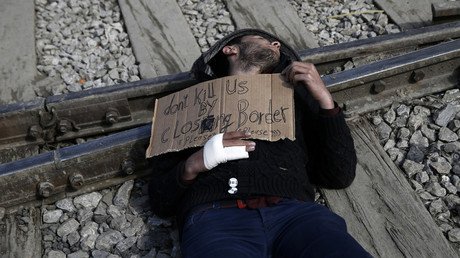EU, Ankara agree deal to return migrants sailing to Greece back to Turkey
The EU and Turkey have reached an agreement on limiting migration to Europe during the talks in Brussels on Friday, various officials said.
“The deal with Turkey [is] approved,” Czech Prime Minister Bohuslav Sobotka wrote on Twitter in the final hours of the two-day summit.
“All illegal migrants who reach Greece from Turkey starting March 20 will be returned,” he added.
The deal w/ Turkey approved by #EUCO. Sunday is the cutoff day. https://t.co/4ywysva3KM
— Tomas Prouza (@CZSecStateEU) March 18, 2016
Dohoda s Tureckem schválena. Všichni nelegální migranti, kteří dorazí do Řecka z Turecka počínaje 20.3. budou vráceni zpět! #EUCO
— Bohuslav Sobotka (@SlavekSobotka) March 18, 2016
This was confirmed by Finland's Prime Minister Juha Sipila, also in a Twitter message.
"The Turkey deal was approved," Sipila said.
Turkki-sopimus hyväksyttiin.
— Juha Sipilä (@juhasipila) March 18, 2016
READ MORE: EU, Turkey reach deal on migrant crisis, implementation set for Sunday
The European Union and Turkey agreed to open negotiations on the accession of Ankara to the EU, according to Sipila.
"By the end of June, the 33rd chapter on the budget is to be also opened," he added.
The agreement still needs to be officially signed off with Turkish Prime Minister Ahmet Davutoglu, who represented Ankara in Brussels.
#EU-#Turkey Agreement in place. A test of implementation starts on Sunday.#EUCO
— Dalia Grybauskaitė (@Grybauskaite_LT) March 18, 2016
According to the deal, Turkey would take back all illegal migrants, who cross to Greece, including those from Syria, in return for the EU taking in thousands of Syrian refugees directly from Turkey.
Ankara would also be rewarded with money compensations, early visa-free travel and progress in its EU membership negotiations, Reuters reported.
The European Union also agreed to speed up the provision of 3 billion euros, which it promised to Turkey earlier, and allocate another 3 billion by 2018 after Ankara puts up list of projects requiring EU assistance.
Davutoglu explained the deal by saying that the number of Syrian refugees taken by the EU from Turkey, will equal the number of illegal immigrants returned by the block to the country.
The Turkish PM also stressed that Ankara expects the €3 billion ($3.8bn) promised “in the coming months.”
Merkel satisfied but ready for setbacks in EU-Turkey deal
German Chancellor, Angela Merkel, said she was satisfied with the EU-Turkey migration deal, but added that there will be complications before its fully implemented.
“I have no illusions that what we agreed today will be accompanied by further setbacks. There are big legal challenges that we must now overcome,” she said at a press-conference after the Brussels talks.
However, the chancellor stressed that the agreement has “an irreversible momentum and it was very important for me that we managed to agree all that among the 28 [EU member states] today," AP reported.
Merkel also said that the agreement with Ankara will stem the flow of refugees to Greece, delivering a blow to smugglers’ business model.
The deal sends a “clear message… to anyone, who sets out on this dangerous route not only risks his life but also has no prospect of success," she stressed.
The chancellor said that European leaders "hope that, with this, irregular migration will end in a short time," according to Reuters.
She also addressed the 15,000 refuges stuck at the Idomeni camp on the Greece-Macedonia border, assuring them that now – after the deal is signed – “Greece will put asylum procedures in motion or redistribution to other European countries will take place."
Merkel urged the people “to move to other accommodation where the conditions will be significantly better" while they are being processed.
However, she stressed that refugees won’t be given the right to choose a specific EU country, in which to settle during redistribution.
Europe is facing its biggest refugee crisis since World War II, with over a million migrants from the Middle East arriving in the continent via Turkey last year, according to the International Organization for Migration.
The fate of almost three million Syrian refugees, who remain in Turkey, was the prime concern of both sides ahead of the Brussels talks.













